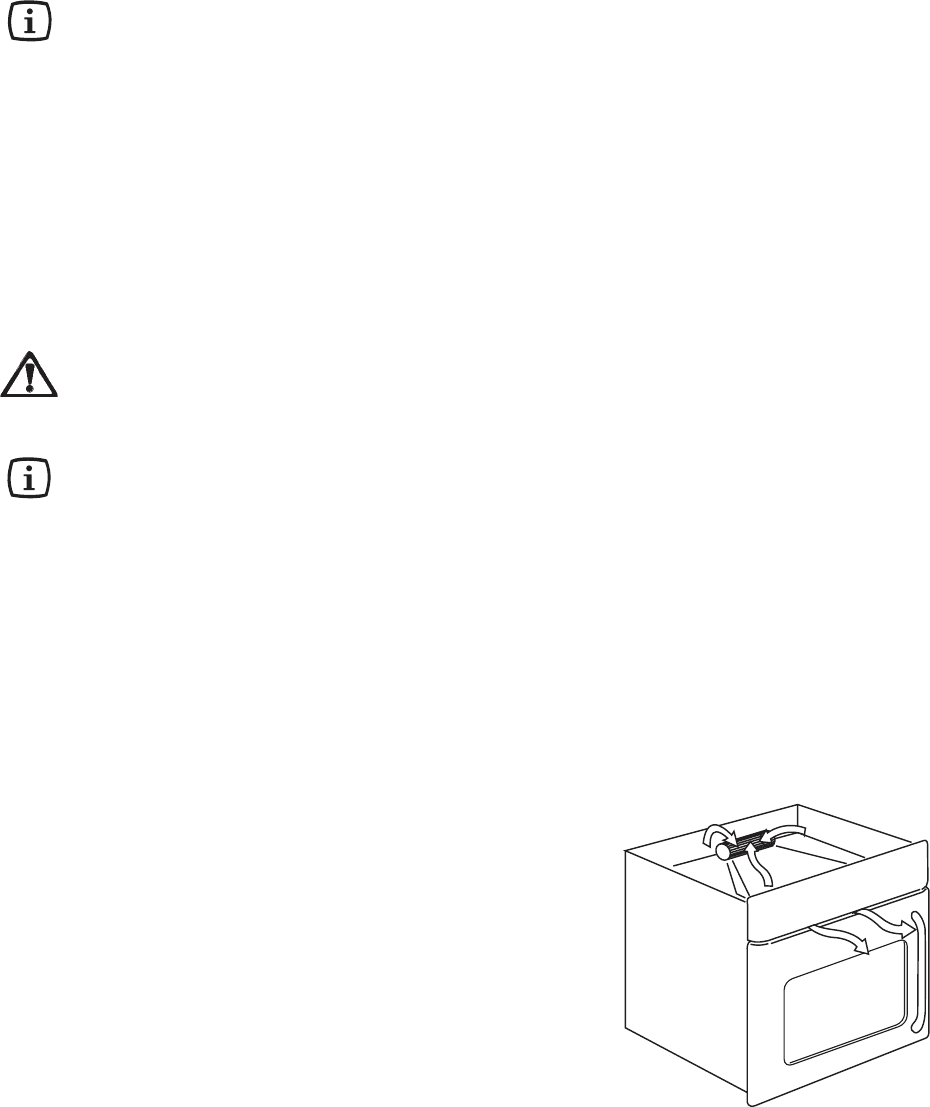
13
Condensation and steamCondensation and steam
Condensation and steamCondensation and steam
Condensation and steam
Condensation and Steam
The oven is supplied with an exclusive system which
produces a natural circulation of air and the constant recycling
of steam. This system makes it possible to cook in a steamy
environment and keep the dishes soft inside and crusty
outside. Moreover, the cooking time and energy
consumption are reduced to a minimum. During cooking
steam may be produced which can be released when opening
the oven door. This is absolutely normal.
AA
AA
A
lways stand back from the oven whenlways stand back from the oven when
lways stand back from the oven whenlways stand back from the oven when
lways stand back from the oven when
opening the oven door during cooking oropening the oven door during cooking or
opening the oven door during cooking oropening the oven door during cooking or
opening the oven door during cooking or
at the end of it to allow any build up ofat the end of it to allow any build up of
at the end of it to allow any build up ofat the end of it to allow any build up of
at the end of it to allow any build up of
steam or heat to release.steam or heat to release.
steam or heat to release.steam or heat to release.
steam or heat to release.
When food is heated, it produces steam in the same
way as a boiling kettle does. When steam comes in
contact of the oven door glass, it will condense and
produce water droplets.
To reduce condensation, ensure the oven is well
heated before placing food in the oven cavity. A short
oven pre-heating (about 10 minutes) will then be
necessary before any cooking.
We recommend you to wipe away condensation after
each use of the appliance.
CookwareCookware
CookwareCookware
Cookware
• Use any oven proof cookware which will withstand
temperatures of 230°C.
• Baking trays, oven dishes, etc. should not be placed directly
against the grid covering the fan at the back of the oven,
or placed on the oven base.
• Do not use baking trays larger than 30 cm x 35 cm (12
in x 14 in) as they will restrict the circulation of heat and
may affect performance.
Hints and Hints and
Hints and Hints and
Hints and
TipsTips
TipsTips
Tips
The effects of dishes on cookingThe effects of dishes on cooking
The effects of dishes on cookingThe effects of dishes on cooking
The effects of dishes on cooking
resultsresults
resultsresults
results
Dishes and tins vary in their thickness, conductivity, colour,
etc. which affects the way they transmit heat to the food
inside them.
AA
AA
A Aluminium, earthenware, oven glassware and bright shiny
utensils reduce cooking and base browning.
BB
BB
B Enamelled cast iron, anodised aluminium, aluminium with
non-stick interior and coloured exterior and dark, heavy
utensils increase cooking and base browning.
The SafThe Saf
The SafThe Saf
The Saf
ety ety
ety ety
ety
ThermostatThermostat
ThermostatThermostat
Thermostat
This oven is provided with a safety thermostat. In case of
malfunctioning of the main thermostat, and consequent over-
heating, the safety device will stop the power supply to the
appliance. If this happens, call your local repair agent. Under
no circumstances should you attempt to repair the appliance
yourself.
The Cooling FanThe Cooling Fan
The Cooling FanThe Cooling Fan
The Cooling Fan
The cooling fan operates during cooking. Air is expelled
through vents between the oven door and the control panel,
as shown in the diagram.
The cooling fan may run on after the oven is switched off to
keep the controls cool. This is quite normal.


















